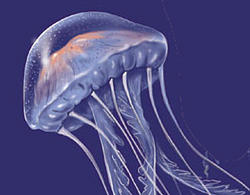| The Evolution of Governance | 2003-04-10 16:02 3 comments |
 by Flemming Funch by Flemming FunchElisabet Sahtouris speaks lucidly about how life works, how evolution works, and how we can learn great lessons from the intelligence of nature. Here's from a small article on the Evolution of Governance: "In studying the Earth's evolution, the most fascinating story I know is that of ancient beings who created an incredibly complex lifestyle, rife with technological successes such as electric motors, nuclear energy, DNA recombination and worldwide information systems. They also produced - and solved - devastating environmental and social crises and provided a wealth of lessons we would do well to consider."That was two billion years ago, mind you. And we're not talking about extra-terrestrials, we're talking about our earthly ancestors, one celled microbes. Despite literally having no brains, they faced crisises very similar in structure to what we face today, and they developed peaceful synergetic solutions. "Their crisis came about when food supplies were exhausted and relatively hi-tech respiring bacteria ("breathers" with electric motor drives) invaded larger more passive fermenting bacteria ("bubblers") to eat their insides out - a process I have called bacterial colonialism or imperialism. The invaders multiplied within these colonies until their resources were exhausted and all parties died. No doubt this happened countless times before they learned cooperation.And, if it isn't already clear, your body is one of the results. A democratic cooperative society of billions of individual beings. Now, the question is, do you really want to come across as being more stupid than the bacteria in your intestines? It would be a bit embarrassing if we big complex beings with huge brains couldn't even figure out how to organize ourselves in a viable manner. If we're really stupider than the parts we're made of. Particularly when a several billion year unbroken succession of our ancestors has succeeded inpeccably until now. |